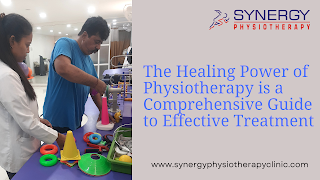The Healing Power of Physiotherapy is a Comprehensive Guide to Effective Treatment
Introduction
Physiotherapy, also known as physical therapy, is a holistic approach to promoting health, preventing injury, and aiding recovery from various physical conditions. It involves a wide range of therapeutic techniques and exercises designed to improve mobility, strength, flexibility, and overall function. Whether you're recuperating from a physical issue, dealing with an ongoing condition, or looking for preventive consideration, Physiotherapy Treatment can be an extraordinary excursion towards a better and more dynamic way of life.
Understanding the Essence of Physiotherapy :
Physiotherapy is rooted in the understanding that the body possesses an innate ability to heal itself. A qualified physiotherapist works closely with patients to assess their individual needs, develop personalized treatment plans, and monitor progress over time. By employing various manual techniques, exercises, and state-of-the-art equipment, physiotherapists address a broad range of conditions, including musculoskeletal injuries, neurological disorders, sports-related issues, and more.
The Benefits of Physiotherapy :
- Pain Relief and Management: Physiotherapy offers natural pain relief without the need for excessive medication, focusing on targeting the root cause of pain.
- Improved Mobility and Flexibility: Whether it's a post-injury recovery or age-related stiffness, physiotherapy can help restore and enhance movement and flexibility.
- Injury Prevention: Through targeted exercises and proper body mechanics, physiotherapy can prevent injuries and improve overall physical performance.
- Enhancing Balance and Coordination: Physiotherapy includes exercises that improve balance and coordination, reducing the risk of falls, especially in older adults.
- Rehabilitation After Surgery: Physiotherapy plays a vital role in post-operative recovery, helping patients regain strength and function.
- Management of Chronic Conditions: Individuals with chronic conditions, such as arthritis or chronic pain, can benefit from physiotherapy to improve their quality of life.
Common Techniques and Treatments:
- Manual Therapy: Hands-on techniques, including joint mobilization, massage, and stretching, help alleviate pain and improve joint mobility.
- Therapeutic Exercises: Tailored exercise programs that focus on strength, flexibility, and balance are crucial components of physiotherapy treatment.
- Electrical Stimulation: Using electrical currents, this technique aids in muscle re-education and pain management.
- Heat and Ice Therapy: Applying heat or ice to affected areas can reduce inflammation and promote healing.
- Ultrasound Therapy: This technique uses high-frequency sound waves to facilitate tissue healing and improve blood flow.
Conditions Treated by Physiotherapy:
- Musculoskeletal Injuries: Sprains, strains, and fractures benefit from physiotherapy to restore full function.
- Back and Neck Pain: Physiotherapy can address the underlying causes of back and neck pain, providing long-term relief.
- Sports Injuries: Athletes often turn to physiotherapy to recover from sports-related injuries and enhance performance.
- Neurological Conditions: Stroke, multiple sclerosis, and Parkinson's disease are among the conditions where physiotherapy can improve mobility and function.
Conclusion:
Physiotherapy is a powerful tool in promoting physical well-being and enhancing overall quality of life. With its patient-centric approach and evidence-based treatments, this specialized form of therapy can help people of all ages and conditions achieve their optimal physical potential. Whether you're recovering from an injury, managing a chronic condition, or seeking to prevent future health issues, Physiotherapy Treatment can unlock the body's natural healing power and set you on the path to a healthier, more active, and fulfilling life. Consult a qualified physiotherapist to embark on your journey to better health today!


.png)

Comments
Post a Comment